11 Mar 2014 | Europe and Central Asia, News, Russia
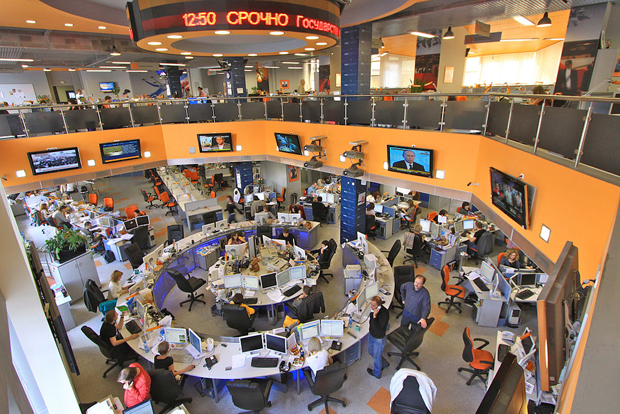
RIA Novosti newsroom (Image: Jürg Vollmer/maiak.info Reusse/Wikimedia Commons)
“I just got fired,” a RIA Novosti journalist told Index a few days ago. On 9 December 2013, a surprise decree by president Putin ordered the closure of the state-owned, 73-year-old RIA — one of Russia’s most established news services. It’s liquidation has now kicked in, and it will be replaced by a new agency named Rossiya Segodnya (“Russia Today”), headed by Dmitry Kiselyov, who made his name as an abrasive Kremlin-loyal television personality. Employees have had to choose between staying at the replacement agency or sign redundancy contracts. Most journalists at RIA’s well-respected English service are leaving. They have no intention of taking orders from Kiselyov, who is famous for his homophobic and anti-Western rants. He once said, on TV, that “fining gays is not sufficient — they should not be allowed to give blood, or sperm and in case of a car accident, their hearts should be burnt or buried as useless”.
With 60 offices abroad, RIA was a vast media empire presenting a wide range of information. In April 2013, over 9 million internet users visited its website, which made it the 11th most popular European news website. Christopher Boian, who directed RIA’s foreign language news website and helped make it more dynamic and more respected, told Index: “This was a big state-owned media outlet. It was unique. It seemed to reflect a maturity about the Russian media. We were not anti-Putin or pro-Putin but just trying to look objectively at what was going on.”
Rossiya Segodnya will share its editor in chief with the Kremlin-funded TV news channel RT. It is unlikely to strive for objectivity. In his first speech at RIA’s office, Kiselyov declared: “[Russia’s] post-Soviet journalism is unlike Western journalism in that it does not reproduce values, it produces them.” And added: “Objectivity is a myth which is proposed and imposed on us. Imagine a young man puts his hand on the shoulder of a girl, and in the best case, says ‘you know, I have long wanted to tell you that I regard you objectively.’ Is that what she is expecting? Not likely. In the same way our country — Russia — needs our love.”
In January, Dozhd, a popular independent TV channel which came to prominence for its coverage of anti-government protests in late 2011, was dropped by satellite and cable operators after it caused outrage publishing a poll asking readers whether Leningrad should have been surrendered to the Nazis in order to save hundreds of thousands of lives. Putin’s press secretary Dmitry Peskov declared that the “station had crossed all the limits of what can be tolerated” and that the question posed by the survey was an offence “much more serious from the point of view of morality and ethics”. The channel has now lost around 80 per cent of its audience and, as a result, most of its advertisers. It’s facing imminent closure.
“The situation does not look promising. Things seem to have been orchestrated, as five independent operators dropped us in a matter of weeks, but we can’t prove they have been,” Pavel Lobkov, a veteran journalist who was dismissed from federal channel NTV in 2012 — for what he alleges were political reasons — and found a new home in Dozhd, tells Index. “When it comes to the press, the threat is not direct anymore. The strategy is now more refined. It’s like chess”, he adds.
In February, Ekho Moskvy (Echo of Moscow), one of Russia’s few independent broadcasters, majority-owned by Gazprom-Media — the media arm of the gigantic conglomerate that is one of the bases of Kremlin power — encountered difficulties. Its head was dismissed and replaced by an editor from state media, after a reshuffling of the board of directors tilted the balance in favour of pro-government people. Alexei Venediktov, Ekho’s long-standing editor, has just been reelected by the journalists at the station, though his position still needs to be approved by the board.
“As soon as Putin became president, he moved against the media and made sure national TV was under control – which proved to be a very effective tool,” Maria Lipman, chair of the Carnegie Moscow Centre’s Society and Regions Program, told Index. Financial and legal leverage was used to shut down media outlets that were seen as potential threats. In 2000, the independent TV channel NTV — which had been critical of the war in Chechnya — was acquired by Gazprom-Media, its owner forced to flee the country and its editorial line changed. “What remained were oases of non governmental media. The government was permissive because there was no political opposition. You could make noise, but no one would pick it up,” Lipman adds.
According to her, a new crackdown began in 2012 with the return of Putin to power in the wake of big protests. A series of dismissals took place and a few publications closed down — always explained by economic factors. “Gradually there was a sense that the realm of free expression was shrinking, that there were fewer jobs to be found and more self censorship,” she says.
The recent years have seen an unprecedented increase in the concentration of media ownership, with huge media properties accumulating in the hands of a few Kremlin loyalists. These include Yuri Kovalchuk, a member of Putin’s close circle dubbed “Russia’s Murdoch”, who owns the National Media Group, or Alisher Usmanov, Russia’s richest man (who fired the editor of Kommersant Vlast in 2011 for having published pictures with anti-Putin slogans in an issue alleging election fraud). Usmanov recently acquired control over VKontakte, Russia’s largest social network, whose founder has left Russia. Lobkov tells me he believes the Kremlin’s next target will be the internet. In January, parliament passed a law giving the state powers to close blacklisted websites.
“The Kremlin has been sophisticated enough not to go against individuals or editors. Its favourite tool is to exert its influence through media owners,” Lipman says, pointing out that not every case of pressure against a media outlet necessarily comes from the government, as there are “competitions, personal scores, a combination of factors.” Dozhd owners say their troubles started after they reported on the expensive properties owned by certain Kremlin officials.
“Following recent events in Ukraine, the propaganda on national media has been extremely intense. State media has presented the picture of a fascist coup inspired by the west. For anyone interested there is no shortage of information on the web. When the crisis subsides it remains to be seen whether the outlets that have covered it in a different fashion will be punished,” Lipman says.
Last week, Izvestia newspaper reported that a United Russia party deputy is readying legislation that would, among other things, make it a crime to “allow publications of false anti-Russian information.” The tightening of control over the Russian media is likely to continue.
This article was posted on March 11, 2014 at indexoncensorship.org
3 Mar 2014 | Europe and Central Asia, News, Russia, Ukraine
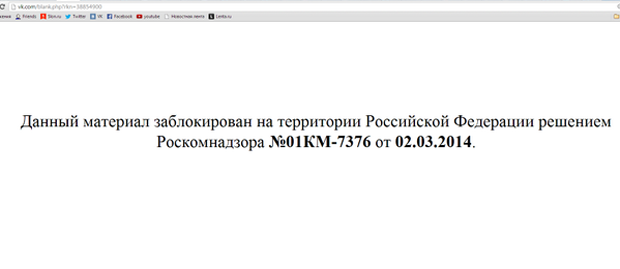
(Image: @ilya_shepelin/Twitter)
Russian authorities have blocked access to 13 sites connected to “Ukrainian nationalist organisations” on the social media site Vkontakte, Russia’s answer to Facebook.
The Russian General Prosecutor’s Office requested that Roskomnadzor — the Federal Service for Supervision of Communications, Information Technology and Mass Media — block the pages, the body said in a statement Monday. The pages promoted Ukrainian nationalist groups and “contained direct appeals to Russian people to conduct terrorist activities,” the statement read.
There had been reports over the weekend of pages on Vkontakte being blocked, but the message from Roskomnadzor confirms this.
While it is unclear which sites the ban covers, it appears a group connected to the Euromaidan protests is one of them. A screen grab, allegedly from a Euromaidan group, first shared by a journalist from Russian news site slon.ru, read: “This material was blocked on the territory of Russian Federation by a decision by the State Communication Committee” and that the decision had been made on 2 March.
This article was posted on March 3, 2014 at indexoncensorship.org
28 Feb 2014 | Digital Freedom, Europe and Central Asia, News, Russia
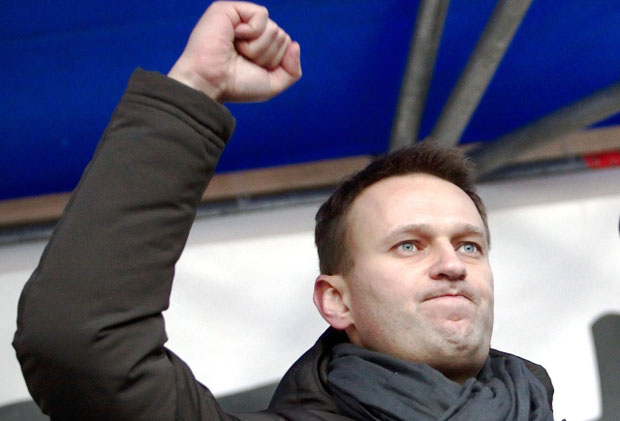
Alexei Navalny addresses a rally (Image: Roma Yandolin/Demotix)
Russian anti-corruption activist and regime critic Aleksei Navalny has been placed under house arrest for two months, against the backdrop of an ongoing investigation against him and his brother for money laundering and embezzlement. He has also been banned from using the internet and talking to the media.
A Moscow court made the ruling following a request from the Russian Investigative Committee, on the basis that Navalny had violated a travel ban by leaving Moscow. Earlier this week, he was sentenced to 7 days in jail for “disobeying police during an unsanctioned public” after taking part in a rally on 24 January day before. He is also currently serving a five-year suspended sentence for theft of 16 million roubles, charges he has insisted are politically motivated.
“I believe the new measures are based on trumped up grounds in order to restrict my political activities,” Navalny said during his hearing.
This article was posted on February 28, 2014 at indexoncensorship.org
26 Feb 2014 | Europe and Central Asia, News, Russia
1. The fifth ring malfunction
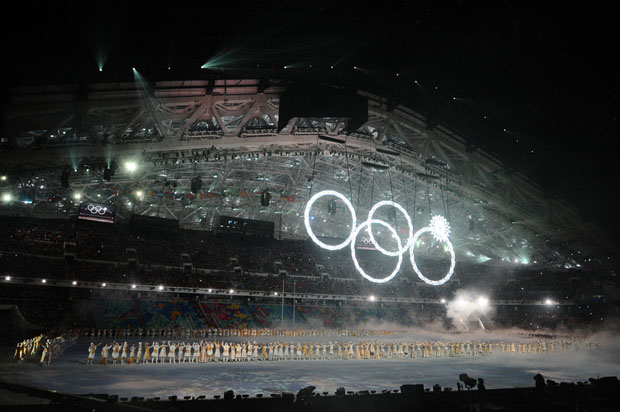
(Image: Jaroslav Francisko/Demotix)
The lighting rig which proudly illuminated one less Olympic ring than it should have caused considerable embarrassment for the Russian organisers of the opening ceremony, as Sochi 2014 opened its gates to the athletes. Known as the “stubborn snowflake” Russian viewers at home were greeted with footage from the Opening Ceremony rehearsal, so they were none the wiser. The Russians later showed their funny side by only featuring four rings in the Closing Ceremony performance.
2. Pussy Riot getting whipped in the face
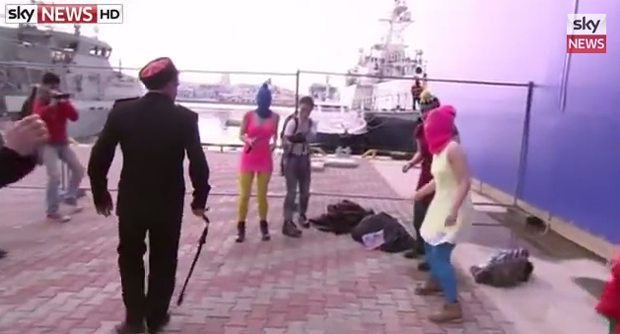
(Image: Sky News/YouTube)
While pre-emptive arrests meant many activists were unable to protest at all, five members of the punk group Pussy Riot and their cameraman were attacked by Cossack security patrols as they performed under a sign advertising the Winter Olympics.
Footage showed Cossack security staff whipping band members, pulling off their ski masks, and throwing them to the ground.
Russian deputy prime minister Dmitry Kozak dismissed the attacks: “The girls came here specifically to provoke this conflict,” he explained. “They had been searching for it for some time and finally they had this conflict with local inhabitants.”
While the international media covered the face-whipping incident in fairly minute detail, Russian press clippings about the arrest are hard to come by. Pussy Riot’s previous stunt in Moscow’s main cathedral, which landed them with a jail sentences and heavy fines, have already been scrubbed from the internet.
3. Justin Kripps’ website
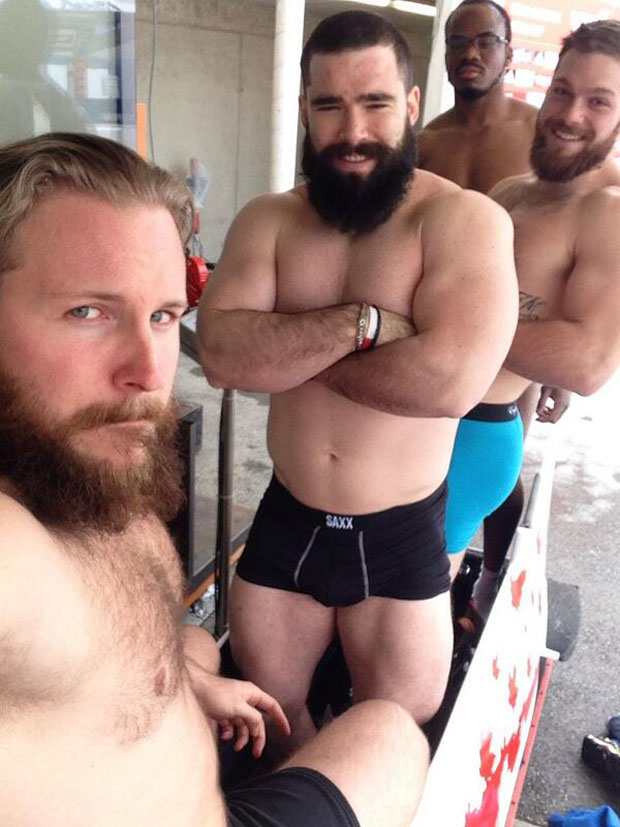
(Image: @justinkripps/Twitter)
Russian fans hoping to keep updated by the Canadian bobsleigher’s website were disappointed, as Russian censorship authorities blocked access to it. It’s still unclear why, but it may be linked to a risque photo Kripps tweeted a month prior to the Games. The snap featured his burly four-man bobsled team in their underwear at a weigh in. The photo went viral, in particular within the gay community.
4. Almost every story about corruption, gay-bashing, forcible evictions and the environment
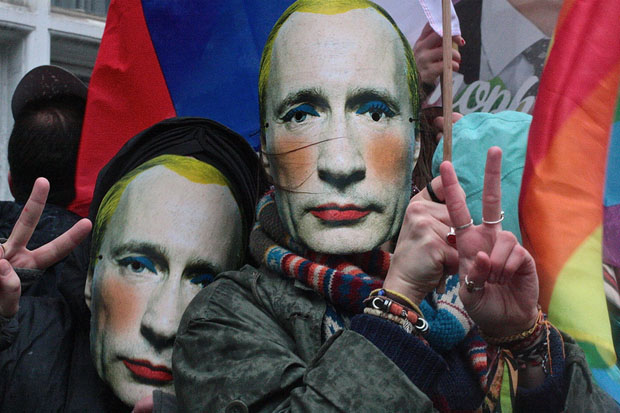
(Image: Heather Blockey/Demotix)
While the run-up to Sochi might have been dominated by negative stories in the Western media, with tales of homophobia, corruption and environmental destruction, local journalists had to be a lot more cautious when reporting the “true” face of Sochi. Strict surveillance measures were imposed on all journalists’ emails, social media and internet use – to keep any negative stories from breaking.
“It seems to me that some of these surveillance measures were conscientiously made public … to send a message,” commented investigative journalist and security services expert Andrei Soldatov while at the Games.
Self-censorship, he says, has become a “big problem” among local reporters and investigative journalists – who often felt scared to report on the wider political context of Putin’s games. “There are some fears that Sochi was a test ground … these kind of measures may be made commonplace in other parts of Russia,” he added.
BONUS: And…Russians accuse US of censorship and malicious media bias
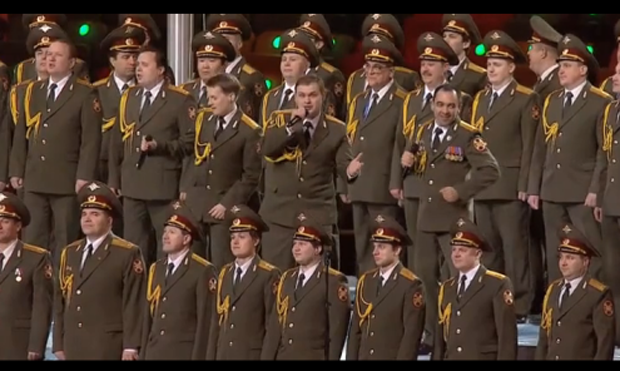
(Image: Screenshot)
Censorship during NBC’s coverage of the Opening Ceremony included missing out a live performance by girlband t.A.T.u, omitting a Russian police choir performing Daft Punk’s “Get Lucky,” deleting Communist-themed vignettes, and failing to air a congratulatory speech by IOC chief Thomas Bach, praising the Russians. Russian media whooped with glee when the hashtag #NBCFail started trending on Twitter in response to the censorship.
American magazine The Nation published a rare honest analysis of the American media’s vitriol against Russia, noting that even before the Games began, the Washington Times had written off the venues as a “Soviet-style dystopia” and warned in a headline, “TERRORISM AND TENSION, NOT SPORTS AND JOY.”
Provocative BuzzFeed headlines like “Photographic Proof That Sochi Is A Godforsaken Hellscape Right Now” and the Twitter account @SochiProblems, provoked outrage in Russia. One Russian netizen took such offence with @SochiProblems that he travelled to London and created his own photo tour of the city “in Sochi style”. “The Other Side of London, where the guided tours don’t go” is a depressing trip through some of London’s worst outer districts. The results (translated from Russian) make for sombre viewing, tinged with humour.
The infamous double toilet in Sochi also has a doppelganger in London, as one Russian Instagram user, living in the capital, proved. The side-by-side facilities, identical to the toilets which athletes had endlessly mocked in the Olympic village, were installed in a typical upmarket hipster cocktail bar.
This article was posted on 25 February 2014 at indexoncensorship.org








